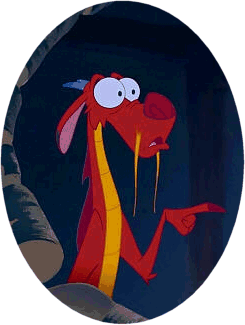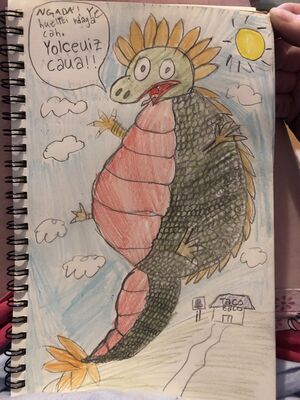Quetzalcoatl
Quetzalcoatl, "Big Q," "Q Grande," or "Quetzalcoalltito" as he was affectionately nicknamed, was a Mesoamerican deity and God of Quesadillas. He was the supposed offspring born out of wedlock to the Mayan Goddess of War, Huahuachuitl and Afrika Bambaataa and therefore half God, half DJ. The Olmecs, indigenous Mesoamericans and notorious critics of the depiction of velociraptors in the movie Jurrasic Park, were the first to identify Quetzalcoatl as a "feathered serpent." Quetzalcoatl's importance in Mesoamerican society changed overtime as STDs became more prevalent among those who converted to Christianity and as Mesoamericans migrated north for summer jobs.
Etymology[edit | edit source]
The origin of the name Quetzacoatl is disputed, but in Nahuatl, the ancient language of the Aztecs, Coatl meant God or more accurately "Jesus" and Quetza meant "Cheese covered" or "Enchirito", so the full translation would be "Cheese covered Jesus." Although some prominent Mexican-American scholars such as Mario Lopez claim the Quetzal distinction is actually derived from the corruption of the name of noted shopping mall pretzel eatery Wetzel's and the inability of Hispanic people to pronounce the "Weh" sound despite their affinity for hanging around shopping mall food courts. Still, some prominent North American and European, Hispanic Culture and American History scholars insist that the name is derived from the sound a Mayan husband would make when he discovered his wife was going shopping and subsequently expected him to join her. Roughly translated it might mean "goddammit" which accounts for it's relevance to the name of a deity.
In Aztec culture[edit | edit source]
The Aztecs sacrificed babies at the first Planned Parenthood in Mexico City in honor of Quetzacoatl which was a practice regarded as "overly sentimental" by their Incan neighbors. When the Spanish arrived they were so horrified by the barbaric acts of infanticide they systematically eradicated all men, women, children, natural resources, and indigenous tropical ecosystems.
Although a popular children's fable in Federally sponsored U.S. public education systems, the belief that the Aztecs confused Quetzalcoatl for Hernando Cortez was disputed in Indiana Jones' autobiography, "The book of Mormon" where he states "Not even mexicans are that stupid" and asserted the origins of the story are based on the Christian tenet that Jesus rose from the Dead and will return to Earth to battle the devil.
Dinosaur[edit | edit source]
As with Raptor Jesus, Quetzacoatl was also a dinosaur, going by the street name of Big Bird (not to be confused Big Bird). The esteemed paleontologist Karl Marx was taking a piss on a line of ants in his backyard when he saw a shovel leaning on a shed. Thinking he might as well dig to China, he liberated an employee from Five Guys for menial labor. After the hole to China was dug, Marx drove his Tesla to the other side. While going through the Earth, he listened to a podcast on pagan gods, and heard the name of Quetzalcoatl. He decided then and there that Communism needed a dinosaur to boost sales and slapped the commie 'us' to the end.
Legacy[edit | edit source]
Big Q is still revered by high-middle class Chicago youth movements looking for symbolic mythology to make them "less white" and therefore more readily identifiable with poor African Americans.
Quetzacoatl was canonized by the Roman Catholic church in 1979 to assert they're ownership of the Mexican people and uphold they're copyrights in Taco Bell via their majority stock ownership in Yum! Brands, Inc. Pope John Paul II was quoted as saying, "Quetzacoatl and Jesus both knew what it was like not to have a dad around." Soon after he further asserted, "Goddamn this Enchrito is gross!" before throwing up on Italian cameraman Vittorio Storaro.


